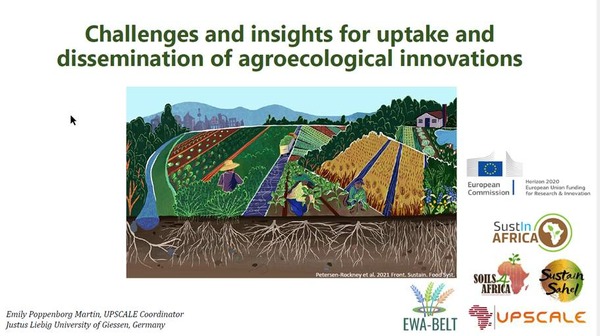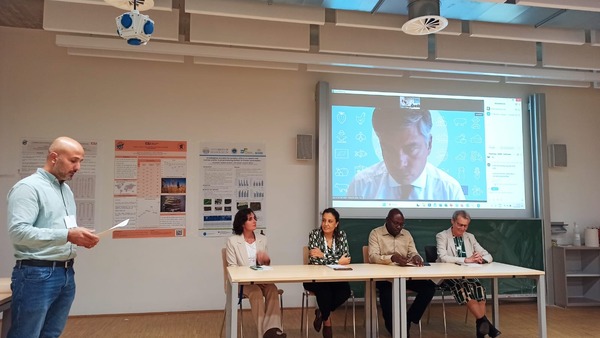Five EU-funded projects focused on sustainable intensification in Africa (Soils4Africa, SustInAfrica, EWA-BELT, UPSCALE, and SustainSahel) joined forces to present and discuss their key findings and communication efforts during the Tropentag 2024 conference at the The University of Natural Resources and Life Sciences in Vienna. The event provided a brief introduction to the projects, presented some of the key results, and engaged the audience in a critical discussion.
The session started with the introduction and greeting by the EU representative Mr. Antonio Malta-Reis emphasizing the importance of collaboration in large EU-funded projects.
The focus theme was Sustainable Intensification following the original research and innovation call SFS-35-2019-2020 - Sustainable Intensification in Africa: African Farming Systems, sustainable intensification pathways. Sustainable intensification is defined as an approach using innovations to increase productivity on existing agricultural land with positive environmental and social impacts. Both words, “sustainable” and “intensification,” carry equal weight [1].
Dr. Giles Young showed that all the projects focused on the improvement of agricultural practices by tackling land and water management (including land degradation where appropriate) and sustainable soil management (including its quality and nutrient uptake) for sustainable intensification. The importance of traditional agricultural practices like grazing methods, livestock, crops and legumes was clear. Agroforestry and push-pull methods were especially advantageous in the African context. Emphasis was given to farming systems that support the restoration of land, increase land productivity and/or bring land back into production.
In terms of the adoption of innovations, Prof. Dr. Emily Poppenborg presented some of the observations from the projects and pointed out that there was confusion in messaging due to uncoordinated incentives. Active dissemination of (co-designed) innovations ongoing among sustainable intensification projects. Short-term projects lack the means for long-term follow-up and backstopping; even when mainstreamed into state institutions & extension (if available), these lack the means for follow-up without additional long-term funding. Focus on quantitative Performance Indicators (# adopters) as a measure of impact encourages rapid increases without a functioning exit strategy. She concluded that Community-based dissemination and social innovations were crucial counterpoint to individual training & dissemination strategies.
The session continued with an expert panel consisting of Dr. Margherita Rizzu (EWA-BELT) Uniss, Italy, Dr Olfa Boussadia (SustInAfrica) Institut de l'Olivier, Tunisia, Prof. Dr. Eva Schlecht (SustainSahel) Kassel University, Germany and Dr. Shem Kuyah (UPSCALE) JKUAT University, Kenya. Panelists discussed the question of “Transforming food production through SI – what is the role of collaborative research and innovation in the smallholder setting?” Other questions discussed are provided below. Panelists agreed that agroecological approaches present a great potential for sustainable intensification in Africa for food security. Such nature-based solutions using shrubs and trees can significantly reduce the reliance on fertilizers.
Further information
Weblinks
- [1] https://www.cimmyt.org/news/what-is-sustainable-intensification/
- ewabelt.eu: EWA-BELT project website
- sustinafrica.com: SustInAfrrica project website
- upscale-h2020.eu: UPSCALE project website




 tap and then scroll down to the Add to Home Screen command.
tap and then scroll down to the Add to Home Screen command.